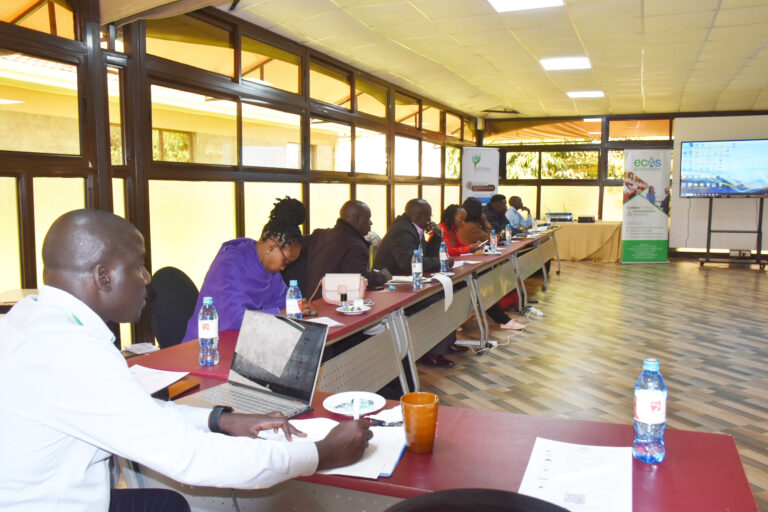
CONCEPT NOTE
INTERNATIONAL TRAINING ON MASTERING PROJECT AND PROGRAMME MANAGEMENT SKILLS
COURSE BACKGROUND
Effective project and programme management is critical for translating strategic goals into tangible results—especially within public institutions, NGOs, and development organizations. As initiatives grow in complexity, professionals need advanced tools and methodologies to manage resources, risks, teams, and stakeholder expectations efficiently.
This course by ECAS equips participants with the knowledge and practical capabilities required to manage projects and programmes successfully, from initiation through to implementation and evaluation. With a focus on development and public sector contexts, the course blends international best practices (PMI, PRINCE2, Agile) with contextualized approaches suited to real-world challenges in Africa and beyond.
Participants will learn to think both tactically and strategically—handling short-term deliverables while aligning them with long-term impact. Special attention is paid to integrating sustainability, results-based management, and adaptive leadership throughout the project lifecycle.
COURSE OBJECTIVES OF THE TRAINING
By the end of this course, participants will be able to:
- Understand and apply core principles of project and programme management.
- Design and manage complex initiatives using structured methodologies.
- Develop and monitor work plans, budgets, and risk registers.
- Lead diverse project teams with clarity and motivation.
- Communicate with stakeholders and manage expectations effectively.
- Use monitoring and evaluation to assess outcomes and improve future performance.
WHAT YOU WILL LEARN
This course provides comprehensive skills for professionals managing or overseeing multi-phase initiatives. You’ll gain practical insights and hands-on tools to lead successful projects and programmes from start to finish.
- Project lifecycle management and work breakdown structures
- Programme-level planning and alignment with strategic goals
- Stakeholder analysis and communication planning
- Risk identification, mitigation, and adaptive responses
- Budgeting, procurement, and resource management
- Monitoring, evaluation, and reporting tools
- Leadership and team performance in dynamic environments
DURATION AND PROGRAM
TARGET PARTICIPANTS
This course is designed for mid- to senior-level professionals who manage or oversee development initiatives across sectors. Ideal participants include project and programme managers, M&E specialists, operations managers, technical leads, donor coordination officers, and consultants in government, NGOs, and international development agencies.
The course also benefits those transitioning into leadership roles within project teams, as well as those responsible for training or mentoring staff in programme delivery. Prior project experience is helpful but not mandatory.
TRAINING STYLE
The modules will be taught through PowerPoint presentations, and lectures and will include a case study/field visit, breakout sessions, case studies and other interactive discussion components.
The course will also include a few guest speakers, both in person and via Zoom and other online learning platforms for overseas speakers. This provides useful real-world insights alongside the more theoretical aspects of the course.
The conference faculty shall consist of experienced decision makers, as well as practitioners and representatives from established educational and research institutions active around climate change, engineering and international development. Throughout the course, theoretical presentation of concepts will be moderated and more group discussions and plenary engagements will be optimized. PowerPoint presentations will be made by facilitators and resource persons, to highlight key concepts before embarking on group work.
TRAINING MODULES
| No | Module | Details | |
| Strategic Foundations of Project and Programme Management |
This module introduces participants to the essential frameworks, standards, and principles of project and programme management. It lays the strategic foundation necessary for managing initiatives that align with organizational goals and deliver long-term impact.
Key Topics:
|
||
| Project Design, Planning, and Resource Management |
Participants will learn how to turn strategic ideas into executable project plans using industry-standard tools and approaches, including budgeting, scheduling, and resourcing.
Key Topics:
|
||
| Risk Management and Adaptive Implementation |
This module helps participants anticipate and mitigate risks throughout the project lifecycle and adapt to evolving conditions in complex environments.
Key Topics:
|
||
| Leading Teams and Managing Stakeholders |
A practical leadership module focused on people management, stakeholder communication, and managing team dynamics for successful project delivery.
Key Topics:
|
||
| Monitoring, Evaluation, and Reporting for Project Success |
This module strengthens participants’ ability to track performance, evaluate results, and communicate outcomes for learning and accountability.
Key Topics:
|
||
| Simulation and Real-World Application |
Participants consolidate learning by working in groups on a simulated project scenario, applying planning, leadership, and M&E skills in a controlled setting.
Key Topics:
|
||
9. GENERAL NOTES
- Training manuals and additional reference materials are provided to the participants.
- Upon successful completion of this course, participants will be issued with a certificate.
- We can also do this as a tailor-made course to meet organization-wide needs. Contact us to find out more: info@ecasiafrica.org.
- Payment should be sent to our bank account before the start of training and proof of payment sent to: info@ecasiafrica.org.
ABOUT ECAS INSTITUTE
The ECAS Institute designs and delivers independent and targeted training, research, and consulting services. Our work focusses on climate change and resilience building, carbon markets, renewable energy, nature-based solution, biodiversity conservation, agriculture and food systems, We are located in Nairobi Kenya and work across the African region. We have implemented training and research assignments in Kenya, Tanzania, Uganda, South Sudan, Somalia, Malawi, Rwanda, Congo, and South Africa. Globally, we have supported our partners from the UK, Denmark, Italy, Sweden, Germany, and USA.

